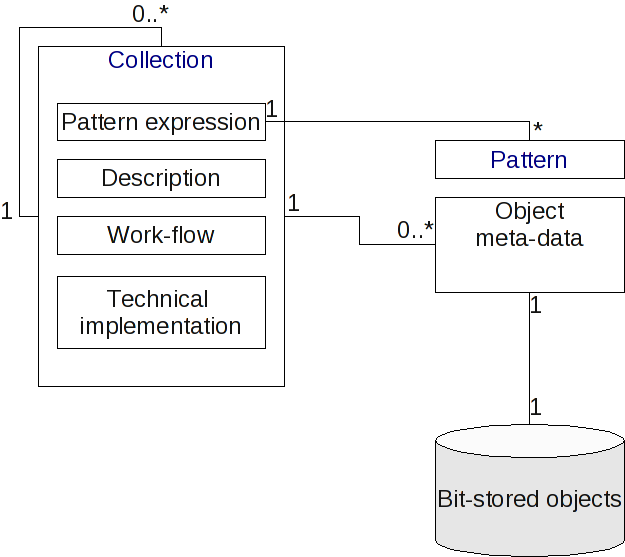|
Size: 1493
Comment:
|
← Revision 16 as of 2010-03-17 13:13:45 ⇥
Size: 3043
Comment: converted to 1.6 markup
|
| Deletions are marked like this. | Additions are marked like this. |
| Line 3: | Line 3: |
| So the abstraction layers are: | {{attachment:Collections-diagram.png}} |
| Line 5: | Line 5: |
| <<Anchor(nestedCollections)>> For more info on nested collections please see: [[../Nested Collections| Nested collections]] <<Anchor(general)>> === General about collections === There are basically two kinds of collections, those based on the content and those based on the media. Pragmatism is to be applied when choosing the nature of the collection, for instance one huge reel-tape collection (media-based) is not desirable. In part due to the fact that many different origins represent the content of the reel-tape collection ex radio, music, spoken word, interviews etc.. Newspaper collection are much more suited to be media collection, despite the fact that the papers originate form a range of sources ex micro-film, digital images, hard-copies etc.. Mandatory elements are inclusive but not limited to: *'''Title''' -- something descriptive, not to long. '''MUST''' match the page name. |
|
| Line 7: | Line 18: |
| *'''Workflow''' -- a how to for the collection, implementation / usage. | |
| Line 9: | Line 21: |
| = Pattern expression = ''' The why ''' |
<<Anchor(patternExp)>> == Pattern expression == ''' The foundation of the choices for the collection ''' |
| Line 14: | Line 27: |
| = Collection description = | Be sure to include the patterns that you use and describe the way relationships affect the pattens. <<Anchor(description)>> == Collection description == |
| Line 17: | Line 33: |
| Sum up the elements in the collection here | Sum up the elements in the collection here, focus on core descriptive and technical metadata fields. |
| Line 19: | Line 35: |
| = Workflow = | <<Anchor(workflow)>> == Workflow == |
| Line 23: | Line 40: |
| This will be the section that is most useful for the personnel working with the digitization process and/or the conversion of old collections. | |
| Line 24: | Line 42: |
| = Technical = | <<Anchor(technical)>> == Technical == |
| Line 27: | Line 46: |
| Consider using a drawing to illustrate relations or for instance include code/XML snippets | Consider using a drawing to illustrate relations or for instance include (psudo)code/XML snippets. ---- <<Anchor(ExsistingCollections)>> <<PageList(GuidelinesForNewDatamodel/Collections/)>> |
A collection description is the formalization combined with the Pattern Expression, that documents the used patterns and the rationalizations upon which the collection is based.

For more info on nested collections please see: Nested collections
General about collections
There are basically two kinds of collections, those based on the content and those based on the media.
Pragmatism is to be applied when choosing the nature of the collection, for instance one huge reel-tape collection (media-based) is not desirable. In part due to the fact that many different origins represent the content of the reel-tape collection ex radio, music, spoken word, interviews etc.. Newspaper collection are much more suited to be media collection, despite the fact that the papers originate form a range of sources ex micro-film, digital images, hard-copies etc..
Mandatory elements are inclusive but not limited to:
Title -- something descriptive, not to long. MUST match the page name.
Pattern expression -- The general, and yet formalized, description of the process and thoughts that forms the basis of the collection architecture. With references to a series of connected patterns.
Collection description -- A short, more technical, description of the elements that form the collection.
Workflow -- a how to for the collection, implementation / usage.
Technical/Collection formalization -- The actual DOMS collection described. This should be represented in the best possible way, it can be a diagram, it can also be represented by a XML file, or parts thereof. Other descriptive measures should also be considered.
Pattern expression
The foundation of the choices for the collection
Write your pattern expression here, it's the rationale behind the collections structure.
Be sure to include the patterns that you use and describe the way relationships affect the pattens.
Collection description
The What
Sum up the elements in the collection here, focus on core descriptive and technical metadata fields.
Workflow
The how
Describe the intended usage of and content addition to this collection, use all available measures that help clarify on the subject. Consider images in addition to text. This will be the section that is most useful for the personnel working with the digitization process and/or the conversion of old collections.
Technical
Be concrete and go into detail of things that require it, especially parts of the collection that is complex or of a special nature.
Consider using a drawing to illustrate relations or for instance include (psudo)code/XML snippets.